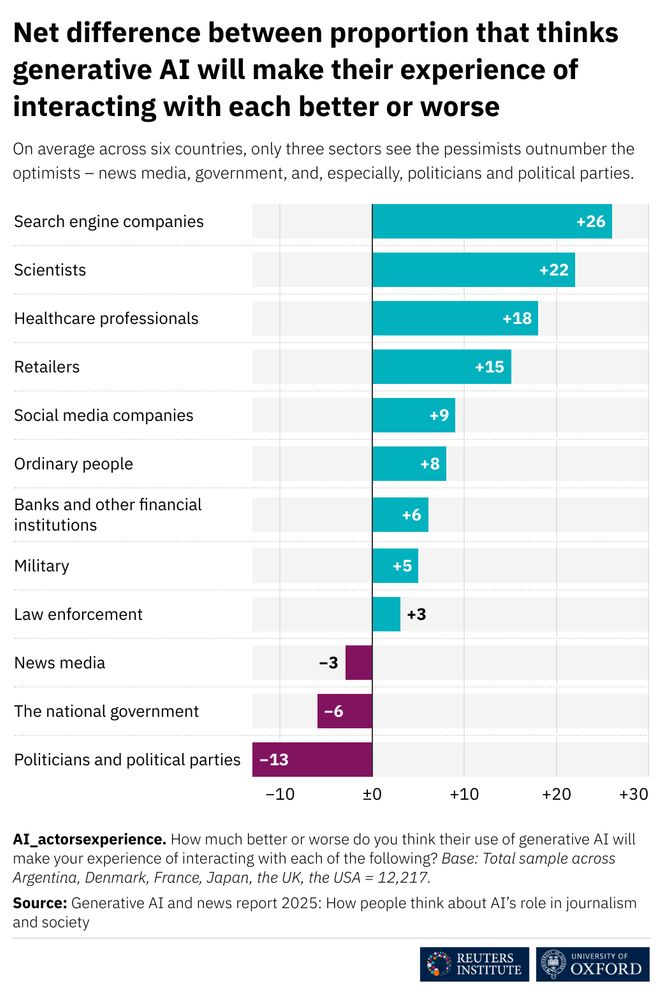ejc.net/events/news-...
reutersinstitute.politics.ox.ac.uk/generative-a...

⬆️ A few systems, like ChatGPT, Gemini and Copilot are more trusted than distrusted.
⬇️ Others, like Meta AI and DeepSeek are more distrusted than trusted.



We've seen a significant shift in the last year, with using AI to get information (e.g. answering factual questions) overtaking using it to create media (e.g. writing emails, making images).
Will this be the main use of gen AI in the future?

But this only applies to standalone systems like ChatGPT. For AI embedded in other products, like Meta AI and Copilot, there's no age gap because the host product is used by people of all ages.

Worth remembering that the public's use of a lot of the tools favoured by experts, like Claude and Perplexity, is still very marginal - 1% weekly.

by Richard Fletcher — Reposted by: Meredith Broussard
First, gen AI use has grown rapidly.
Most people have tried out gen AI at least once (61%), and 34% now use it on a weekly basis - roughly doubling from 18% a year ago.

We aim to add a bit of nuance to what we already know about news avoidance in general, particularly on the association between avoidance and specific emotional responses to climate news.
doi.org/10.1177/1464...
Reposted by: Richard Fletcher
More optimists than pessimists for e.g. science and search engines, but more pessimists than optimists for news media, government, and – especially – politicians 1/3

Reposted by: Richard Fletcher
These are two of the questions we explore in a new report, based on fresh survey data from 🇦🇷🇩🇰🇫🇷🇯🇵🇬🇧🇺🇸
🔗 Full report
buff.ly/mv3Jc5r
🧵 Key findings in thread

Reposted by: Richard Fletcher, Hugo Mercier, Andreas Jungherr
Our new @reutersinstitute.bsky.social survey research (n ≈ 12,000) with @richardfletcher.bsky.social & @rasmuskleis.bsky.social explores this.


Reposted by: Richard Fletcher
🇦🇺 Vince Chadwick
🇺🇸 Dante Dallago
🇧🇬 Boryana Dzhambazova
🇳🇬 Patrick Egwu
🇫🇮 Salla-Rosa Gröhn
🇮🇳 Banjot Kaur
🇬🇧 William Kremer
🇲🇽 Adriana Navarro Ramírez
🇭🇷 Barbara Strbac
🇵🇸 Shatha Yaish
reutersinstitute.politics.ox.ac.uk/news/10-jour...


Reposted by: Richard Fletcher


Reposted by: Richard Fletcher
Read the summaries of the research they'll be sharing below 👇

Reposted by: Richard Fletcher
Read our announcement
reutersinstitute.politics.ox.ac.uk/news/directo...

Also important to remember that these are people's perceptions. People can see fairness or unfairness where there is none.
But, middle-aged people in countries with more middle-aged journalists are more likely to think coverage of people their age is fair.
That's not to say representation isn't important - and for various reasons it is hard to find patterns at the national level
In the US those on the right are much less likely to think their views are covered fairly, but this is not a common pattern.



We outline some interesting demographic differences (more details in 🧵)...
doi.org/10.1177/1464...

Reposted by: Richard Fletcher
The successful candidate will lead on the delivery, strategic development, and long-term financial sustainability of all Journalist Programmes at the Institute.
Apply by Mon 1 Sept, noon (UK time)
More info: buff.ly/FTCNDd1

Reposted by: Richard Fletcher
It's worth keeping in mind:
1. The name and logo there are the Washington Post's , not Apple's.
2. There is no AI labelling and no way whatsoever for users to know these are summaries created by Apple, not the news org.
bsky.app/profile/geof...
Reposted by: Richard Fletcher
Markets covered: 🇯🇵🇰🇷🇲🇽🇺🇸🇬🇧🇧🇷🇩🇪🇫🇮 🇭🇰🇿🇦🇪🇸🇰🇪
buff.ly/PdP9oxD
🧶 Fndings in thread

